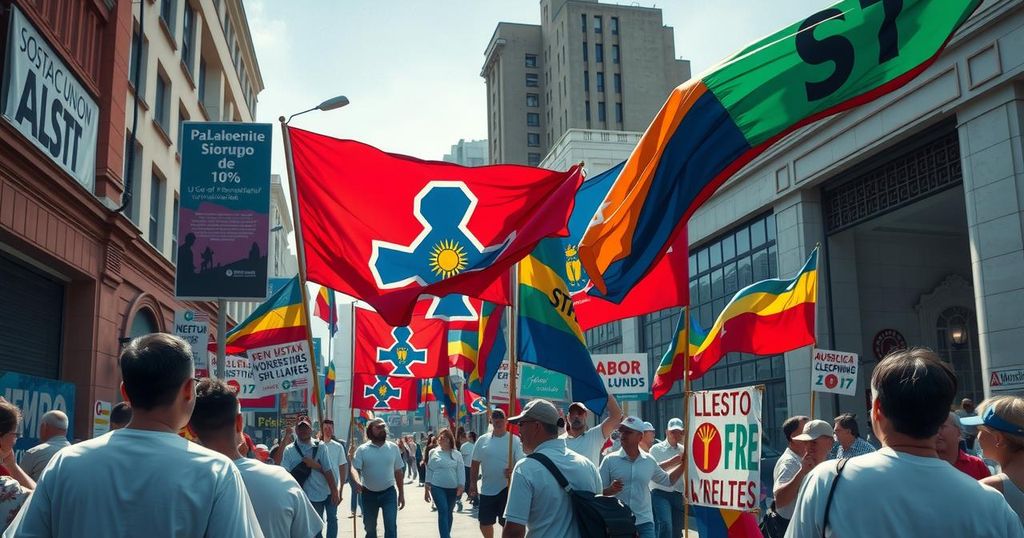Colombia’s Unions Strike for Labor Reform Referendum Proposed by President Petro

Colombia’s labor unions have begun a 48-hour strike supporting President Gustavo Petro’s referendum aimed at reforming labor laws. The strike is a response to Congress’ previous rejection of Petro’s proposals, which he claims harms workers’ rights. Protests in major cities reflect significant worker sentiment, and tensions between Petro and the legislature are intensifying as elections approach.
Colombia’s labor organizations have commenced a 48-hour strike, called by President Gustavo Petro, in support of a referendum intended to allow citizens to decide on significant changes to the nation’s labor laws. The strike began Wednesday and reflects the ongoing tensions between the executive branch under Petro and the legislative body, which he accuses of stalling vital reforms. A key aspect of the referendum is a question regarding the limitation of workdays to eight hours.
The labor movement’s discontent stems from a rejection of Petro’s proposed labor reforms, which lawmakers declined on two occasions, most recently last March. Following this, the president put forth a 12-question referendum plan on May 1. However, a mere two weeks later, Congress voted narrowly against it, which led Petro to label the actions of lawmakers as fraudulent and urge laborers to take to the streets in support of his initiative.
Fabio Arias, president of the United Workers’ Central, emphasized the sentiment among union members. “We are telling the Senate that it cannot continue legislating against the working class,” he stated, stressing the importance of the referendum as a way to restore labor rights. The union aims to mobilize approximately 3 million workers during this strike.
In major cities across Colombia, protesters have taken to the streets. In Bogotá, demonstrators disrupted public bus lanes, causing significant transportation delays. One protester, Yeimy Cante Toro, voiced her frustrations, saying, “I’m mobilizing because I feel that my rights have been violated,” as she participated in the demonstration in the capital.
Amidst escalating tensions, Interior Minister Armando Benedetti announced that should Congress not readdress the referendum by June 1, Petro will proceed to issue an official decree authorizing it. The discord between Petro and Congress extends back to the initiation of his term in 2022, intensifying in light of upcoming elections. As Colombia’s first leftist president, Petro’s potential reelection hangs in the balance as he strives to solidify his legacy.
Political analysts have commented on the implications of Congress’s rejections. Mauricio Velásquez, a political science professor at the University of Los Andes, suggested that by denying the labor reform, Congress inadvertently provided Petro with an opportunity to enhance his political capital amidst a challenging environment. He remarked, “Congress gave the government a lifeline at a moment of great weakness by rejecting the labor reform, giving (Petro) the chance to use legislative failure as a catalyst for political engagement.”
In summary, Colombia’s labor unions initiated a 48-hour strike to support President Petro’s referendum aimed at reforming labor laws, following Congress’s repeated rejections of his proposals. The protests, which have seen considerable participation in urban centers, signal widespread discontent among workers over their rights and legislative actions. As tensions rise, the president’s calls for a referendum reflect both a push for labor reform and a broader political strategy as elections loom on the horizon.
Original Source: www.independent.co.uk







